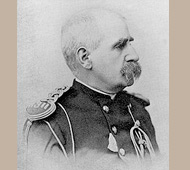John Gregory Bourke, Captain, Third Cavalry, U. S. Army
+ Add Author to My Preferences
John Gregory Bourke was born in Philadelphia, Pennsylvania, to Irish immigrant parents, Edward Joseph and Anna (Morton) Bourke. His early education was extensive and included Latin, Greek, and Gaelic. When the Civil War began, John Bourke was fourteen. At sixteen he ran away and lied about his age; claiming to be nineteen, he enlisted in the Fifteenth Pennsylvania Volunteer Cavalry, in which he served until July 1865. He received a Medal of Honor for "gallantry in action" at the Battle of Stones River, Tennessee, in December 1862. He later saw action at the Battle of Chickamauga.
 His commander, Major General George H. Thomas, nominated Bourke for West Point. He was appointed cadet in the United States Military Academy on October 17, 1865. He graduated on June 15, 1869, and was assigned as a second lieutenant in the Third U.S. Cavalry. He served with his regiment at Fort Craig, New Mexico Territory, from September 29, 1869 to February 19, 1870.
His commander, Major General George H. Thomas, nominated Bourke for West Point. He was appointed cadet in the United States Military Academy on October 17, 1865. He graduated on June 15, 1869, and was assigned as a second lieutenant in the Third U.S. Cavalry. He served with his regiment at Fort Craig, New Mexico Territory, from September 29, 1869 to February 19, 1870.
He served as an aide to General George Crook in the Apache Wars from 1872 to 1883. As Crook's aide, Bourke had the opportunity to witness every facet of life in the Old West-the battles, wildlife, the internal squabbling among the military, the Indian Agency, settlers, and Native Americans.
John G. Bourke kept a diary in sequential journals throughout his adult life, documenting his observations in the West. He used these notes as the basis for his later monographs and writings.
In 1881 Bourke was a guest of the Zuni Indians, where he allowed to attend the ceremony of a Newekwe priest. His report of this experience was published in 1888 as The use of human odure and human urine in rites of a religious or semi religious character among various nations.
While in Washington he was one of the board of the Anthropological Society.
Source: Wikipedia

